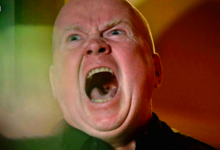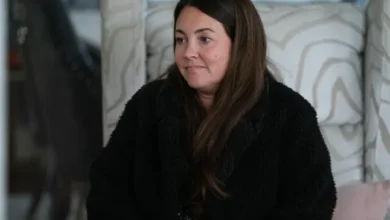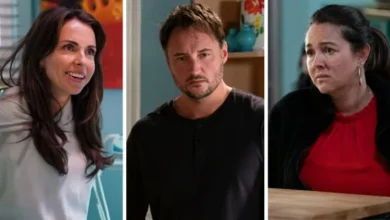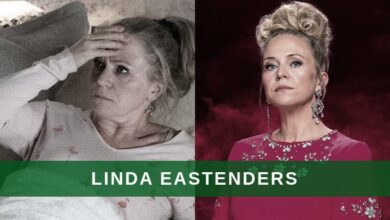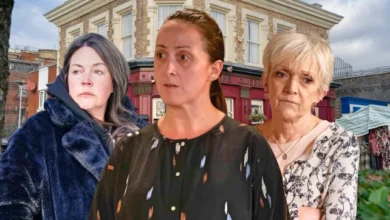This Phil Mitchell storyline is a vital change of pace for his character

You don’t need to be an avid EastEnders fan to know that Phil Mitchell (Steve McFadden) is the ultimate ‘hard man’ of British telly.
This iconic character has graced our screens for nearly 35 years now; punching, huffing, and boozing his way through anything and everything the writers have thrown at him.
He’s been shot twice, married five times, overcome alcohol and crack c.o.c.a.i.n.e addictions, survived multiple car crashes — the list goes on — all while maintaining the trademark toughness and Mitchell machismo that the character is known for.
Recently, however, something has shifted. After years of belittling, bullying, and lashing out at those closest to him, Phil’s behaviour has finally brought consequences to his door. Lately, he is seen to be lonely and isolated; but is unable to admit this to anyone.
In a recent episode, these difficulties were laid bare when viewers witnessed Phil’s outright rejection of support from his old friend Nigel Bates (Paul Bradley). Despite clearly struggling with loneliness, Phil was still too stubborn and proud to accept help, instead becoming defensive and angry when it was offered.
Watching these scenes unfold felt frustrating and depressing because, while this EastEnders storyline is fictional, it depicts a sad reality for many men in the UK.

In truth, Phil Mitchell is the perfect representation of a traditional kind of masculinity – one that prizes stoicism and strength above all else, equates vulnerability with weakness, and teaches men to bottle up their emotions rather than confront them.
For many real-life Phils, showing emotion or admitting they’re struggling feels like a betrayal of what it means to be a man.
This not only fuels male loneliness but also creates the conditions for other, far-reaching harms — including the very same harmful behaviours Phil himself has displayed for decades, from emotional abuse to addiction to physical violence.
Having worked extensively in both child protection and the domestic violence sector, I’ve witnessed firsthand how patriarchal ideals — rigid, outdated beliefs about what it means to ‘be a man’ — can harm both men and women. I engaged directly with male perpetrators of abuse, delivering group workshops designed to change behaviours by challenging patriarchal beliefs.

Many of the men I worked with had learned from an early age that strength meant control, with this later manifesting as violence or emotional abuse in their intimate relationships. Like Phil Mitchell, they had come to equate dominance with strength.
You only need to look at EastEnders’ history to see how Phil’s need for dominance has played out. The character has always used violence, intimidation, and aggression to assert his authority over both the Square and his own family.
He’s been abusive in romantic relationships, physically assaulting Kathy Beale and tormenting Lisa Fowler back in the late 90s and early 00s. He’s bullied his children, notably mistreating Ben after he came out as gay, and he’s ruled over Albert Square with brute force – all because he’s absorbed the belief that to be feared is to be respected, and that control is the only way to maintain loyalty.
This kind of conditioning doesn’t just harm men — it harms everyone. Patriarchy teaches that men should be dominant and emotionally detached while positioning women as weak, passive, and in need of control.
When power and control become defining markers of masculinity, they create a dynamic where the need to assert dominance can easily escalate into abuse.
So while men’s mental health can (and does) suffer under these expectations, it is evidently women and girls who are placed most at risk. This was made clear last year when UK police chiefs declared violence against women and girls (VAWG) a ‘national emergency’, due to the sheer prevalence of such incidents.
Phil’s current EastEnders storyline mirrors reality closely. His recent choices — rejecting Nigel’s help, giving up his businesses, and growing more distant from his family — are all rooted in the belief system that has shaped his entire life: that showing weakness is worse than suffering alone.

The men I worked with, much like Phil, often struggled to express pain or sadness in healthy ways. Conditioned to suppress vulnerability, they turned instead to control, defensiveness, and violence — with many ending up isolated and lonely as a result.
It’s a bold choice for EastEnders to explore loneliness with a character like Phil Mitchell. His tough guy persona has been central to the show for decades, making this vulnerable turn feel even more impactful. But what makes the storyline especially powerful — and true to life — is that it feels so deeply rooted in Phil’s backstory.
Long-time viewers will remember that Phil’s father, Eric Mitchell, was violent and emotionally abusive, effectively instilling in Phil the belief that being a man meant being dominant and never showing vulnerability. That unprocessed trauma has clearly shaped his behaviour for years — driving him to lash out, isolate himself, and rely on anger instead of emotional openness.
Now, EastEnders is telling a powerful and timely story about how those long-held beliefs can leave men emotionally adrift.
As Phil’s downward spiral continues, it seems unlikely he’ll seek help anytime soon. His brother Grant is set to return next month though, which could well offer a lifeline. The question remains whether Phil would be willing to accept this help.
This storyline matters. EastEnders isn’t just telling a gripping personal drama — it’s holding up a mirror to the damage caused by rigid, traditional ideas of masculinity.
Phil’s struggles demonstrate how patriarchal masculinity doesn’t just harm men’s emotional wellbeing — it fractures families, destroys relationships, and, in many cases, fuels abusive behaviours. The same patriarchal beliefs that stop men like Phil from asking for help are the ones that drive control and violence in the first place.
Because men like Phil aren’t born this way. They’re shaped by a culture that values control over compassion, power over vulnerability.
We all need to challenge these long-standing patriarchal norms, because unless we do, we’ll just keep creating more Phil Mitchells — and more victims of the harm they cause.

